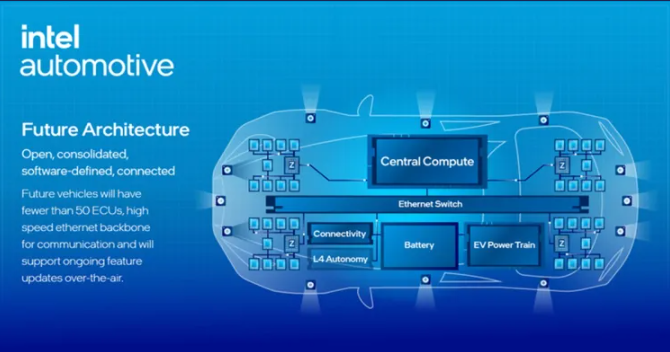 INFRA
INFRA
 INFRA
INFRA
 INFRA
INFRA
Intel Corp. is making an ambitious play for the automotive sector with the launch of specialist versions of its newest, artificial intelligence-enabled chips.
With the launch, the company is throwing down the gauntlet to rivals Nvidia Corp. and Qualcomm Inc., which currently dominate the market for semiconductors that act as the brains of a new generation of smart cars.
At the Consumer Electronics Show in Las Vegas today, the company unveiled a new Software-Defined Vehicle system-on-chip that’s said to have been engineered to infuse AI experiences into next-generation vehicles. The SoCs are flexible too, since developers will be able to say exactly what kind of processing they want in a car.
The Chinese electric vehicle maker Zeekr Co. Ltd. has been named as the first automaker to use Intel’s AI-enhanced software-defined vehicle system-on-chips, and it plans to create an “enhanced living room experience” in its vehicles, with video conferencing and AI voice assistant capabilities.
Jack Weast, vice president and general manager of Intel Automotive, said in a briefing at CES the new AI chips for cars are based on the company’s recently announced AI PC technology, but will be adapted for the durability and performance requirements of cars and other vehicles.
Alongside the new chips, Intel announced plans to acquire French startup Silicon Mobility SAS, which designs SoC technology and software that’s used to control electric vehicle motors and onboard charging systems. Intel didn’t disclose how much it’s paying to buy Silicon Mobility, which is a privately held company that’s part-owned by the venture capital firms Cipio Partners and Capital-E.
The startup’s SoCs are said to incorporate industry-leading accelerators that are designed to be power-efficient. They also use advanced AI algorithms to maximize energy efficiency. The technology will help extend Intel’s reach into the automotive sector, moving beyond high-performance compute to intelligent and programmable power devices.
Intel already has an established presence in the market for infotainment systems, with its chips installed in more than 50 million vehicles worldwide. However, the company trails behind market leaders Nvidia and Qualcomm. Automotive chips are used not only for automated driving, but also to power in-car infotainment software and complex dashboard displays.
Weast told reporters at CES that Intel has “done a pretty terrible job communicating our success in automotive” and that now is the time to change that. He explained that Intel will try to differentiate itself from its rivals by selling automakers chips that can be used across their product lines, with options ranging from the lowest priced silicon to the most advanced.
“If AI in the car means 500 watts … and God knows what costs … it’s not scalable,” Weast said, referring to Nvidia’s powerful but also very expensive products.
However, Intel won’t be alone in pursuing that approach. Last year, Nvidia announced it is partnering with the Taiwanese chipmaker MediaTek Inc. to offer lower-cost chips for automotive makers. MediaTek has a strong presence in the market for Android-based infotainment systems used in lower-cost cars.
It’s expected that China’s electric vehicle market will become a big battleground for Intel and its rivals. Chinese automotive makers are scrambling to introduce automated driving systems and more advanced infotainment capabilities into their vehicles, and Zeekr is notably also a customer of Nvidia as well as Intel.
Weast said Intel will be agnostic with regard to the kind of technologies automakers want to use to power their automated driving and other functions. As such, the company will not require vehicle makers to use the advanced driving chips built by its former mobile chipmaking unit Mobileye Global Inc. Instead, they’ll be able to incorporate their own chips within Intel’s system, helping them keep costs down, Weast said.
Support our mission to keep content open and free by engaging with theCUBE community. Join theCUBE’s Alumni Trust Network, where technology leaders connect, share intelligence and create opportunities.
Founded by tech visionaries John Furrier and Dave Vellante, SiliconANGLE Media has built a dynamic ecosystem of industry-leading digital media brands that reach 15+ million elite tech professionals. Our new proprietary theCUBE AI Video Cloud is breaking ground in audience interaction, leveraging theCUBEai.com neural network to help technology companies make data-driven decisions and stay at the forefront of industry conversations.